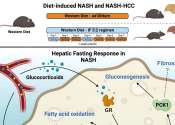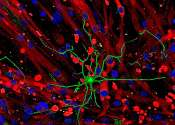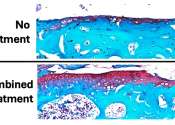Last update:
Endocrinology & Metabolism news
Inflammatory disorders
A faulty iron hormone in the skin may be the root cause of psoriasis
Scientists may have uncovered the root cause of psoriasis, a chronic and sometimes debilitating skin disease that affects 2–3% of the global population. The condition is characterized by red, scaly patches that impact the ...
16 hours ago
0
22
Genetics
The gut microbiome can influence hormone levels, mouse study shows
Researchers at the Francis Crick Institute have shown that the balance of bacteria in the gut can influence symptoms of hypopituitarism in mice. They also showed that aspirin was able to improve hormone deficiency symptoms ...
17 hours ago
0
99
Metabolic reprogramming of T cells may enhance checkpoint inhibitor therapy
Stimulating a key metabolic pathway in T cells can make them work more effectively against tumors when combined with immune checkpoint inhibitor therapy, according to a preclinical study led by researchers at Weill Cornell ...
18 hours ago
0
28

Unlocking the energy crisis in Parkinson's: New findings on metabolic disruptions
Parkinson's disease (PD), the second most common neurodegenerative disorder globally, has long baffled scientists with its progressive nature and debilitating effects on motor function.
20 hours ago
0
7

Researchers discover intercellular communication mechanism behind hormone balance
Researchers led by Jacques Drouin and his team at the IRCM discovered an intercellular communication mechanism behind the balance of hormones needed to keep a human healthy.
20 hours ago
0
27

Discovery of important blood pressure 'switch'—how some cells remember to make renin
University of Virginia School of Medicine researchers have discovered how certain cells have the amazing ability to transform their function to help our bodies control our blood pressure.
14 hours ago
0
13

Microplastics found in urinary tract linked to health risks
A new study challenges a 2019 World Health Organization report that microplastics in drinking water are harmless after confirming their presence in kidney, urine and bladder cancer samples.
20 hours ago
0
0

Protein discovery advances quest for treatment for age- and cancer-related muscle degeneration
With the global population aging rapidly, sarcopenia, a condition that affects millions of older adults and severely diminishes their quality of life, is emerging as an urgent public health issue. Now, a new discovery by ...
21 hours ago
0
0

Pregnant women who sleep less than seven hours a night may have children with developmental delays
Pregnant women who do not get enough sleep may be at higher risk of having children with neurodevelopmental delays, according to new research published in Journal of Clinical Endocrinology & Metabolism, titled "Association ...
22 hours ago
0
0

How male hormones regulate skeletal muscle function
Male hormones (androgens), as their name implies, have an important role in promoting the formation of male sexual characteristics (secondary sexual characteristics). In addition, androgens have anabolic effects, as indicated ...
Sep 25, 2024
0
0

Novel regulator of glucose transport in adipose tissue discovered
The role of the adapter protein PICALM (phosphatidylinositol-binding clathrin assembly protein) in the development of Alzheimer's disease is well documented. Researchers from the German Institute of Human Nutrition Potsdam-Rehbruecke ...
Sep 25, 2024
0
24

Study helps predict how long it will take for testosterone to return to normal after prostate cancer treatment
A study led by researchers from the UCLA Health Jonsson Comprehensive Cancer Center sheds light on testosterone recovery following androgen deprivation therapy (ADT) in men undergoing radiotherapy for prostate cancer, providing ...
Sep 25, 2024
0
0

How do women with disability and LGBTQIA+ people experience menopause?
After hearing about the experiences of the diverse spectrum of people across Australia, the Senate inquiry into issues relating to menopause and perimenopause has released its final report with 25 recommendations.
Sep 25, 2024
0
0

Study reveals natural disasters jeopardize women's reproductive health
In research published in Brain and Behavior, investigators found increased rates of menstrual irregularities in women living in areas affected by the 2023 earthquake in Turkey.
Sep 25, 2024
0
0

GLP1RA could drugs lower high iron levels, study finds
GLP1RA agonists have been increasing in popularity for treating obesity and type 2 diabetes.
Sep 24, 2024
0
1

Scientists uncover limits of metabolic flexibility in squamous cell skin cancer
Scientists at the Eli and Edythe Broad Center of Regenerative Medicine and Stem Cell Research at UCLA have identified key metabolic mechanisms that squamous cell skin cancers use to resist treatment, offering new insights ...
Sep 23, 2024
0
70

Study looks at impact of peritoneal dialysis on thyroid function
Patients undergoing peritoneal dialysis (PD) have significantly higher thyroxine (T4) concentrations than hemodialysis (HD) patients and higher free T4 (FT4) concentrations at 12 and 24 months, according to a study published ...
Sep 23, 2024
0
0

Guidance provided for management of obesity in kidney disease
In a report issued by the American Society of Nephrology and published online Sept. 18 in the Journal of the American Society of Nephrology, guidance is presented for the management of obesity in persons with kidney disease.
Sep 23, 2024
1
0

Homelessness linked to end-stage kidney disease, death in veterans with incident chronic kidney disease
For veterans with incident chronic kidney disease (CKD), a history of homelessness is associated with an increased risk for end-stage kidney disease (ESKD) and death, according to a study published online Sept. 10 in JAMA ...
Sep 20, 2024
0
0

Study links hot flashes to brown adipose tissue activity, childhood exposure to cold
New research from the University of Massachusetts Amherst reveals links between menopausal hot flashes, cold experienced during childhood, and increased activity in brown adipose tissue (BAT), which is a specialized fat that ...
Sep 19, 2024
0
0

Study reveals secrets behind Lycium barbarum's cold and heat resistance efficacy
Lycium barbarum is a traditional and valuable medicinal herb in China. It has the effects of "strengthening muscles and bones with prolonged use, promoting longevity, and resisting cold and heat," according to "Ben Cao Gang ...
Sep 19, 2024
0
0

Weight loss drugs could help fight fatty liver disease
In the fight against fatty liver disease, researchers are looking for any and all possible solutions. But to combat the disease, which is also known as metabolic dysfunction-associated steatotic liver disease, or MASLD, scientists ...
Sep 18, 2024
0
33

New research finds higher levels of leptin indicate brain protection against late-life dementia
New research is more closely linking obesity to dementia. Higher levels of leptin, a hormone that helps maintain normal body weight, is associated with better signal-transmitting brain white matter in middle-aged adults, ...
Sep 18, 2024
0
27

Advanced drug screening: A microphysiological system to assess drug transport and nephrotoxicity
Developing advanced drug screening tools is crucial for the advancement of personalized medicine and the creation of more effective treatments. One organ receiving particular attention in this area is the kidney.
Sep 18, 2024
0
1

Caffeine, coffee linked to lower cardiometabolic multimorbidity risk
Habitual coffee or caffeine intake is associated with a lower risk for new-onset cardiometabolic multimorbidity (CM), according to a study published online Sept. 17 in the Journal of Clinical Endocrinology & Metabolism.
Sep 18, 2024
0
0













































